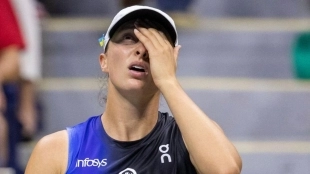Taylor Fritz is no stranger to the competitive and often intense world of professional tennis. Known for his sharp tennis acumen, powerful serve, and no-nonsense approach to the game, Fritz’s candidness off the court is just as notable. In a recent outburst following a tense team event, the American star gave a frank critique of his own teammates, particularly after a controversial issue related to Iga Swiatek during the Billie Jean King Cup. The incident shed light not only on the inner workings of team dynamics but also on the pressure tennis players face in high-stakes, team-oriented competitions.
Fritz’s comments stirred a significant amount of buzz in the tennis community, shedding light on the delicate balance between individual glory and collective effort in a sport known for its solo performances. His words weren’t just an offhand remark—they were an honest assessment of the situation, and his criticism carried weight, given his standing in the tennis world.
The Context: A Tumultuous Billie Jean King Cup Encounter
The Billie Jean King Cup is one of the most prestigious events in women’s tennis, bringing together the best players from around the world to compete not just for titles, but for national pride. During this year’s tournament, a number of high-profile incidents drew attention, with the match between Iga Swiatek and an American player at the center of a heated debate.

While Swiatek herself has been a model of sportsmanship and professionalism, a series of questionable moments between the two teams raised eyebrows. The controversy reached a head when tensions flared during a critical match, and a few moments of questionable behavior from the American contingent—whether it was on-court distractions or unclear support—led to a visibly shaken performance from their side. This was where Taylor Fritz’s perspective began to take shape.
Fritz’s Candid Criticism: “We Didn’t Handle It Well”
In the aftermath of the incident, Fritz didn’t shy away from offering an honest reflection on the performance of his teammates. “We didn’t handle it well,” he remarked during a post-match interview. His comments were directed not at Swiatek or the opposing team, but rather at his own teammates’ mental approach during the match. Fritz’s perspective highlighted a key issue in tennis: the mental fortitude required to perform under pressure in both singles and team formats.
“Team tennis is a different animal,” Fritz noted. “You can’t afford to let the environment or your opponent’s emotions dictate how you play. We weren’t mentally tough enough to handle that pressure, and it showed in our game.”
The American star’s words struck a chord because they reflected a deeper understanding of the psychological battles that occur in team events like the Billie Jean King Cup, where players are not just competing for themselves but for the entire nation.
The Mental Game: Lessons from the Swiatek Incident
What made the ‘Swiatek case’ particularly difficult for the American team was the fact that Swiatek, who has been dominant in recent years, exhibited remarkable composure even in the most intense moments. Known for her calm demeanor and unwavering focus, Swiatek’s performance in the match left little room for distraction. She remained unshaken by the emotional turbulence surrounding the match, maintaining her cool in a situation where many players would have faltered.
This, according to Fritz, was a clear example of how the mental side of the game is often just as important as physical preparation. Swiatek’s ability to focus and perform under pressure was a stark contrast to the American players’ responses, which, in Fritz’s view, could have been better managed.
The young American, while admitting to the frustration that came with the loss, used the opportunity to point out a critical area for improvement in his own team’s approach. “When you’re on a team, you have to be there for each other,” Fritz said. “But that doesn’t mean you lose sight of your own game. I think we got too wrapped up in the emotions of it all and forgot what we needed to do to win.”
The Role of Team Events in Shaping Professional Players
While singles tennis often provides players with a clear path to success and failure based solely on their own abilities, team events like the Billie Jean King Cup challenge players to adapt to a very different kind of pressure. The emotional and mental energy of the entire team is constantly in play, and each member’s performance is intertwined with that of the others. Fritz’s comments reveal the struggle many top-level players face when transitioning from individual success to the demands of a team competition.
For the American team, Fritz’s assessment was a wake-up call. His recognition that the team’s mental toughness was lacking in that moment was not just about reflecting on what went wrong—it was about acknowledging the changes needed to perform better in future team competitions.
Fritz’s Leadership and Accountability
Fritz’s criticism of his teammates was not done with malice, but rather with a sense of accountability and leadership. As one of the most prominent figures in American tennis, he understood that setting the right example was vital for the growth and development of the sport in the country. His willingness to take ownership and point out areas for improvement within the team underscores the maturity and self-awareness that have helped him rise through the ranks of professional tennis.
“Being a leader isn’t just about being the best player on the court,” Fritz explained. “It’s about being honest with yourself and your teammates, even when it’s uncomfortable. If we want to improve, we need to be willing to face the hard truths.”
This level of self-awareness and accountability is rare in professional sports, especially when it comes to players who are still in their prime years. Fritz’s ability to critique the situation with such transparency not only solidifies his standing as a leader but also serves as a model for others looking to thrive in team formats.
Looking Ahead: Can the U.S. Team Bounce Back?
As the U.S. team looks to regroup and refocus after the Billie Jean King Cup, the lessons from Fritz’s candid comments will undoubtedly play a pivotal role in shaping the team’s future strategies. There’s no doubt that the American squad has the talent to compete at the highest level, but the mental preparation required for team events will be just as important as their physical training moving forward.
In light of his assessment, it’s clear that Fritz and his teammates are determined to learn from this setback. The road to recovery won’t be easy, but if they take the time to reflect on what went wrong—both on the court and in their team dynamics—they could come back stronger than ever in future competitions.
Conclusion: The Importance of Mental Toughness in Tennis
Taylor Fritz’s accurate criticism of his teammates after the Swiatek case is a testament to the maturity that defines a top-level tennis player. His acknowledgment of the mental side of the game is not just a critique, but a valuable lesson for any athlete. As the tennis world continues to evolve, understanding how to manage pressure and emotions in team settings will be just as critical as refining physical skills.
In the end, tennis is more than just about hitting winners and making great plays—it’s about how players handle the most challenging moments. If Fritz and his team can use this experience as a catalyst for growth, they could very well be poised for greater success in the future, both in singles and in team events like the Billie Jean King Cup.

